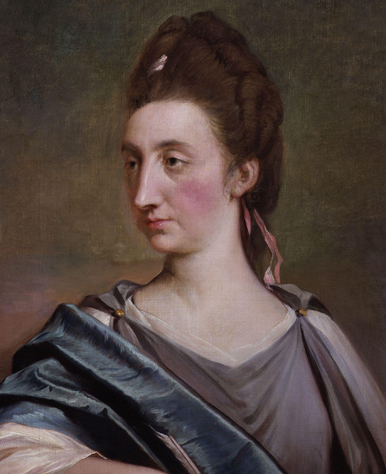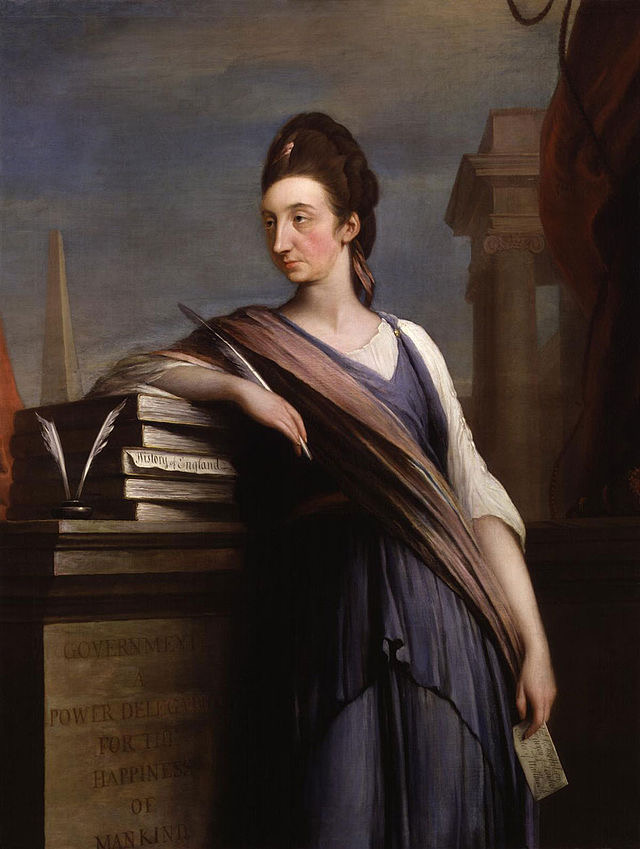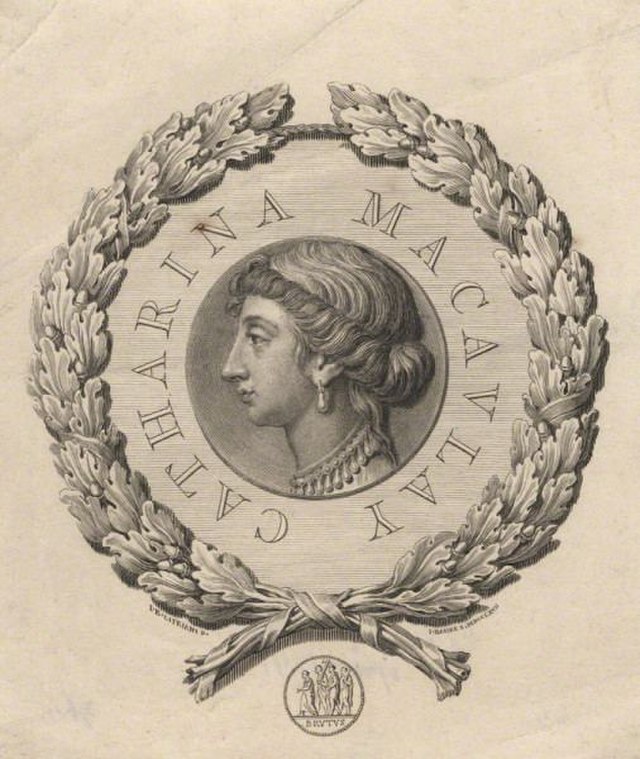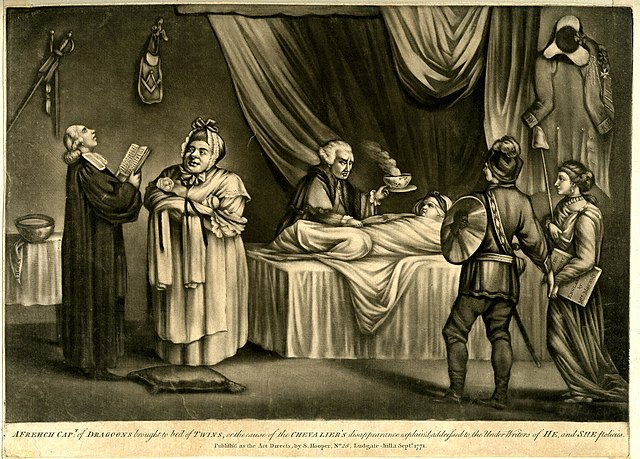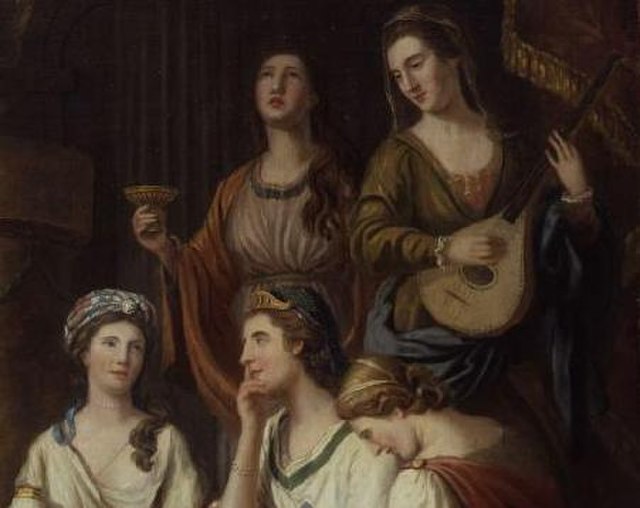Catharine Macaulay, née Sawbridge (later Catharine Graham)
*March 23, 1731 (Olantigh, England)
†June 22, 1791 (Binfield, England)
Spouse: George Macaulay
Macaulay was an English philosopher born near Canterbury in 1731. In 1760 she married the Scottish physician George Macaulay, with whom she had a daughter. After her husband’s death, she married the 26 years younger William Graham.
In her Letters on Education she fought for equality of women and criticized contemporary theories of gender difference. Macaulay argued against Rousseau’s complementarity theory, according to which the subordination of women results from the biologically based difference between men and women. She attributed the intellectual inferiority of most women of her time to their limited position in society and called for consistent coeducation. Accordingly, men and women should be taught the same subjects equally. In addition, she opposed slavery and contempt for humanity and fight for a more democratic state constitution.
-
Primary Sources
Macaulay, C. (ed.) (2009) Erziehung zum Denken. Aachen: Ein-Fach-Verl. (Philosophinnen, 23).
Macaulay, C. (*) Histoire d’Angleterre depuis l’avènement de Jacques I. jusqu’ à la révolution. Paris: Gattey.
Macaulay, C. (1763) The history of England from the accession of James I. to that of the Brunswick line. London: Author.
Macaulay, C. (1765) The history of England from accession of James I. to that of the Brunswick line. London: J. Nourse.
Macaulay, C. (1767) Loose Remarks On Certain Positions to be found in Mr. Hobbes’s Philosophical Rudiments Of Government and Society. London: Davies.
Macaulay, C. (1767) The history of England from the accession of James I. to that of the Brunswick line. (3). London: Author.
Macaulay, C. (1768) The history of England from the accession of James I. to that of the Brunswick line. (4). London: Author.
Macaulay, C. (1771) The history of England from the accession of James I. to that of the Brunswick line. (5). London: Author.
Macaulay, C. (1774) A modest plea for the property of copy right. London.
Macaulay, C. (1774) The English Book Trade 1660-1853. 1974th edn. (A Garland Series). New York.
Macaulay, C. (1778) The history of England from the revolution to the present time in a series of letters to a friend. Bath: Dilly.
Macaulay, C. (1779) Merkwürdige Geschichte von England von der Revolution an bis auf die jetzige Zeit. Leipzig.
Macaulay, C. (1781) The history of England from the accession of James I. to that of the Brunswick line. (6). London: Author.
Macaulay, C. (1783) A treatise on the immutability of moral truth. London.
Macaulay, C. (1783) The history of England from the accession of James I. to that of the Brunswick line. (8). London: Author.
Macaulay, C. (1791) Histoire D’Angleterre: Depuis L’Avènement De Jacques I, Jusqu’A La Révolution. Paris: Gattey.
Macaulay, C. (1792) Histoire D’Angleterre: Depuis L’Avènement De Jacques I, Jusqu’A La Révolution. Paris: Gattey.
Macaulay, C. (1795) Histoire d’Angleterre depuis l’avènement de Jacques I. jusqu’ à la révolution. Paris: Gattey; Fuchs.
Macaulay, C. (17XX-) Merkwürdige Geschichte von England von der Revolution an bis auf die jetzige Zeit. Leipzig.
Macaulay, C. (17XX-) The history of England from accession of James I. to that of the Brunswick line. London: J. Nourse.
Macaulay, C. (1994) Letters on education. 1790th edn. (A Woodstock facsimile). Oxford: Woodstock.
Macaulay, C. (1995) Observations on the reflections of The Right Hon. Edmund Burke, on the revolution in France: In a letter to The Right Hon. the Earl of Stanhope. 1790th edn. London: Pickering.
Macaulay, C. (1996) Letters on education: 1790. (Female education in the age of enlightenment / with an introd. by Janet Todd, 3). London: Pickering.
Macaulay, C. (1997) On Burke’s reflections on the French Revolution: 1790. 1790th edn. (A Woodstock facsimile). Oxford: Woodstock Books.
Macaulay, C. (2009) Erziehung zum Denken. (Philosophinnen, Bd. 23). Aachen: Ein-Fach-Verl.
Macaulay, C. (2012) Observations on the reflections of Edmund Burke on the Revolution in France. (Cambridge Library Collection. History). Cambridge: Cambridge Univ. Press.
Macaulay, C. (2020) Observations on a Pamphlet, Entitled, Thoughts on the Cause of the Present Discontents. 1770th edn. Norderstedt: Hansebooks GmbH.
Green, K. and Macaulay, C. (eds.) (2019) The correspondence of Catharine Macaulay. New York, NY: Oxford University Press (Oxford new histories of philosophy).
-
Secondary Sources
Beckwith, M.C. (1953) Catherine Macaulay: Eighteenth-century English rebel ; a sketch of her life and some reflections on her place among the historians and political reformers of her time. Columbus, Ohio, Ohio State Univ., Diss.
Broad, J. (ed.) (2007) Virtue, Liberty, and Toleration: Political Ideas of European Women, 1400-1800. Dordrecht: Springer (The New Synthese Historical Library, 63).
Brock, C. (2006) The feminization of fame, 1750 – 1830. (Palgrave studies in the enlightenment, romanticism and cultures of print). Basingstoke: Palgrave Macmillan.
Brooks, A. (2019) Women, politics and the public sphere. Bristol, UK: Policy Press.
Davies, K. (2005) Catharine Macaulay and Mercy Otis Warren: The revolutionary Atlantic and the politics of gender. Oxford: Oxford Univ. Press.
Gardner, C.V. (2000) Rediscovering women philosophers: Philosophical genre and the boundaries of philosophy. (Feminist theory and politics). Boulder, CO: Westview Press.
Gardner, C.V. (2018) Women Philosophers: Genre and the Boundaries of Philosophy. Boulder: Routledge.
Graper Hernandez, J. (2013) ‘The anxious believer: Macaulay’s prescient theodicy’, International Journal for Philosophy of Religion.
Green, K. (2012) ‘Liberty and virtue in Catherine Macaulay’s enlightenment philosophy’, Intellectual History Review.
Green, K. (2017) ‘Catharine Macaulay’s French connections’, Eighteenth Century Life.
Green, K. (2020) Catharine Macaulay’s republican enlightenment. New York: Routledge Taylor & Francis Group.
Green, K. and Macaulay, C. (eds.) (2019) The correspondence of Catharine Macaulay. New York, NY: Oxford University Press (Oxford new histories of philosophy).
Hill, B. (1992) The republican virago: The life and times of Catherine Macaulay, historian. Oxford: Clarendon Press.
Hutton, S. (2007) ‘Virtue, God, and Stoicism in the Thought of Elizabeth Carter and Catherine Macaulay’, in Virtue, liberty, and toleration. Dordrecht: Springer.
Jenkins, E.J. (2007) Eighteenth-Century British historians. (Dictionary of Literary Biography, Vol. 336). Detroit, Mich: Gale.
Jokic, O. (2015) ‘The odds and the ends: What to do with some letters of Catharine Macaulay’, The Eighteenth Century.
Lee, C.M. (1969) The growth and development of children. London: Longmans.
Montecinos, V. (ed.) (2017) Women presidents and prime ministers in post-transition democracies. London: Palgrave Macmillan (Palgrave studies in political leadership).
Nünning, V. (1998) A revolution in sentiments, manners, and moral opinions: Catharine Macaulay und die politische Kultur des englischen Radikalismus,1760 – 1790. Zugl.: Köln, Univ., Habil.-Schr., 1995. (Anglistische Forschungen, 255). Heidelberg: Winter.
Rosenberg, B. (2006) Mavericks of the sky: The first daring pilots of the US Air Mail. New York: Morrow.
Simonton, D. (2017) Women in European Culture and Society: A Sourcebook. London: Routledge.
Taylor, C. (ed.) (2011) Hume and the enlightenment. London: Pickering & Chatto.
The patriot divine to the female historian: An elegiac epistle. To which is added, the lady’s reply (1779). London: printed for Fielding and Walker.
The peculiarities of liberal modernity in imperial Britain (2011). (The Berkeley series in British studies, 1). Berkeley, Calif.: Global Area and International Archive Univ. of California Press.
Titone, C. (2004) Gender equality in the philosophy of education: Catharine Macaulay’s forgotten contribution. (Counterpoints, 171). New York: Lang.
Warren, M.O. (ed.) (2009) Mercy Otis Warren: Selected letters. Athens: University of Georgia Press.
Women in the eighteenth century: Constructions of femininity (1990). (World and word series). London: Routledge.
Women theorists on society and politics (1998). Waterloo, Ont: Wilfrid Laurier University Press.
Women Theorists on Society and Politics (2006). Waterloo: Wilfrid Laurier University Press.
- Online Sources
-
ECC
-
Media
- Projects
-
Quotes
You cannot copy content of this page









